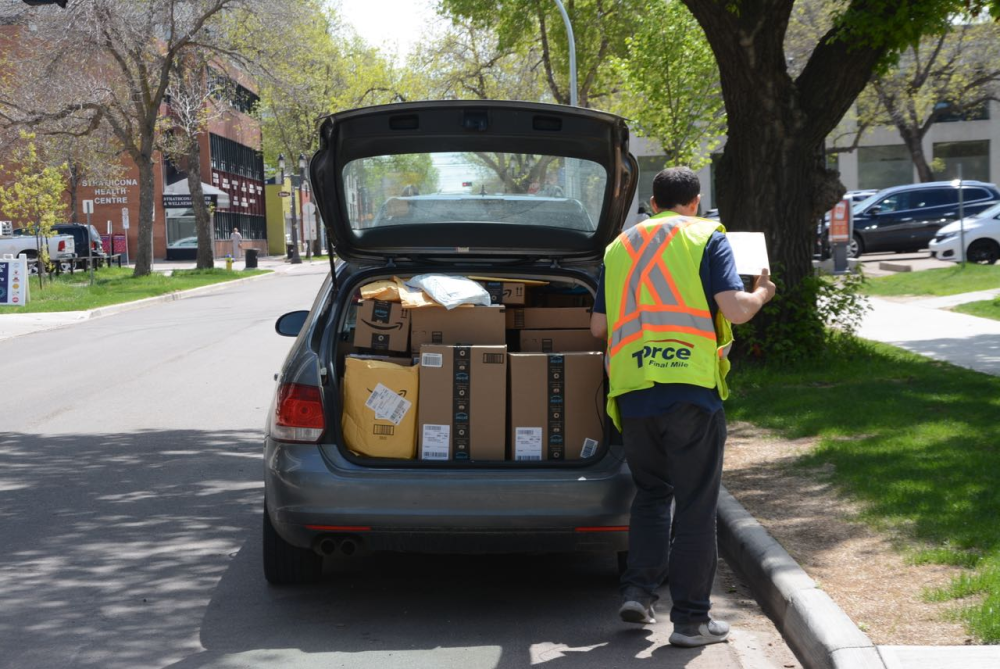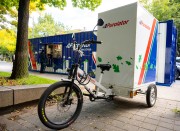Our already expanding appetite for online shopping has grown so significantly during the COVID-19 pandemic, demand for deliveries is exceeding traditional peak periods. On a recent Tuesday in May (following the Victoria Day weekend), Canada Post made a record 2.1 million parcel deliveries — three times the norm for this time of year.
This pandemic-driven growth in online shopping comes atop an already rapidly changing goods movement landscape. Between 2016 and 2018, the average number of online purchases made by Canadians grew by 58 per cent. This growth is good for the economy — in fact, transportation and warehousing contributed 4.5 per cent of Canada’s GDP in 2018. While goods movement is a backbone of the economy, it’s also a growing source of greenhouse gas (GHG) emissions, projected to surpass passenger emissions by 2030. In Just-in-Time Delivery: Environmental scan of policies and practices, we look at emerging goods movement trends, environmental impacts, and solutions businesses can deploy to alleviate these impacts.
We identified three major trends changing the landscape of goods movement in Canada:
The increasing popularity of just-in-time delivery
Though the just-in-time delivery practice (i.e. when goods aren’t ordered or received until absolutely necessary) may be more convenient for the customer, it can also mean that freight movement is less consolidated resulting in more half-filled trucks on the road. As retailers are forced to quickly respond to customer demands, they’re left with less time to optimize their delivery practices and ensure that each truck leaves with a full truckload on a well-planned route. As we know, more trucks on the road leads to more GHG emissions.
Higher volumes of online sales
Increased connectivity and the emergence of more sophisticated e-commerce platforms has led to more online shopping. COVID-19 has played a pivotal role in accelerating this shift. Since stay-at-home orders were put into effect, the share of revenues stemming from online purchases has nearly doubled for retail merchants.
Demand for free shipping
Even as customers’ expectations for fast delivery increases, their willingness to pay for it has fallen — 62 per cent of consumers expect free delivery for everyday purchases. As some businesses and corporations set the standard for fast, free and flexible delivery, there is increasing pressure for other online retailers to provide this same level of service. This pressure and competition is expected to result in higher environmental impacts.
The takeaway here is not for online shoppers to feel guilty for their habits. We all do it! It’s increasingly a part of our lives, and the solution here isn’t to stop online shopping but to shop smarter (including shopping locally, even online). It’s important, too, that businesses reduce the carbon intensity of deliveries, and increase consumer awareness of the impacts of their delivery choices. How can they do this? Businesses should consider:
-
Limiting free, fast shipping
-
Taking advantage of default bias by making low-carbon shipping (i.e. standard shipping) the default option and make it a highly desirable option
-
Educating consumers on the environmental impact of their chosen delivery method at check-out
-
Reducing spontaneity and demand for single item baskets by encouraging predictable, consolidated delivery (e.g. subscription services)
From multinational corporations, small businesses to individual shoppers, we all have a role to play. Canada Post, Purolator, UPS, and Fresh City Farms, for example, have joined forces with us and others through the Urban Delivery Solutions Initiative to make freight operations in Canadian cities more efficient and sustainable. Through actions like fleet electrification, curbside management, and delivery consolidation, to name just a few, the solutions exist to help reduce the environmental impact of online shopping —while still recognizing and supporting the essential role goods movement serves in our economy and in our daily lives.







